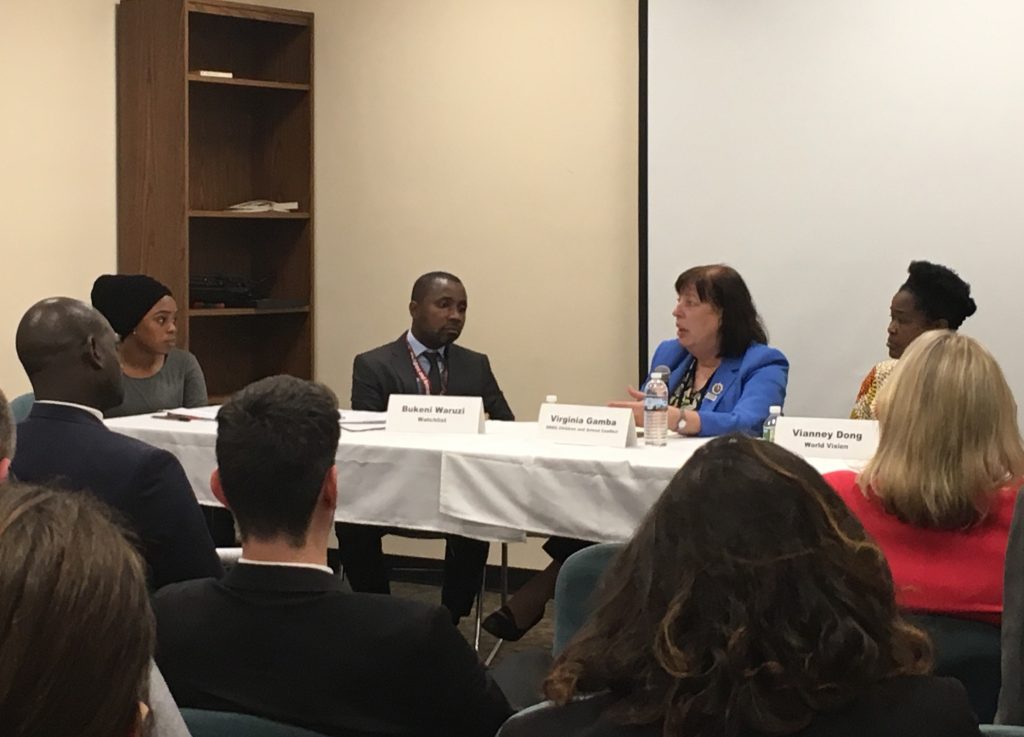On September 27, 2018, Watchlist’s Executive Director Bukeni Waruzi moderated a panel discussion on children affected by war organized by World Vision International and the Office of the Special Representative of the UN Secretary-General for Children and Armed Conflict (OSRSG-CAAC). Under the title “Hear Our Voices: Listening to Children Affected by Conflict,” the event brought together international experts to discuss children’s perspectives on protection and rights. Held during the opening week of the UN General Assembly’s 73rd session, the panel discussion sought to increase the attention of high-level policy makers on the situation of children affected by armed conflict.
The Special Representative of the Secretary-General for Children and Armed Conflict (SRSG-CAAC) Ms. Virginia Gamba opened up the discussion by describing the stories of some of the children she has met during her visits to conflict-affected countries, including South Sudan, which she visited in early September. She highlighted the importance of providing adequate, long-term support for reintegration programming for children formerly associated with armed forces and groups, and pointed to the obligation of States to protect and promote children’s rights: “If one has the privilege of governing a sovereign State, one has the responsibility for what happens inside it.”
The SRSG-CAAC also noted with concern: “Children are at the center of armed conflict today.” This is certainly the case in the Kasai region of the Democratic Republic of Congo (DRC), where children make up more than two million of the 3.8 million people in need of humanitarian assistance and protection across the region, according to UNICEF.

© Save the Children/Dragica Mikavica.
World Vision’s Senior Advisor for Southern Africa, Ms. Vianney Dong, presented her organization’s latest report Will You Hear Us? 100 Children in DRC Tell Their Story, which describes the lingering effects on children of the 2016-2017 violence in the Kasais. Almost all of the children with whom World Vision spoke had fled the violence, and most had seen first-hand the deaths of others, including, in some cases, parents, siblings, or friends. Many had also been recruited by armed groups or militias, and expressed continued fear of recruitment, sexual violence, and heavy labor.
Ms. Dong urged policy makers to do more for these children, including investing in mental health and psychosocial support, as well as long-term reintegration support for boys and girls formerly associated with armed groups. In particular, she underscored the need for dedicated funding for humanitarian protection in the Kasais, which remains critically underfunded. According to the UN Office for the Coordination of Humanitarian Affairs (OCHA), as of June, less than eight percent of children and families targeted for protection programming in the Kasais had received the support they need.
Following on Ms. Dong’s presentation, Mr. Mark Canavera, co-director of the CPC Learning Network, explained the importance of actively seeking out children’s views and integrating them into humanitarian programs. Child protection programming can only be effective, he said, when it reflects children’s needs and opinions.
Youth ambassadors from conflict-affected countries also attended the event, thanks to the support of Save the Children International. Save the Children’s Girl Champion from Nigeria, Maryam, appealed for the UN, nongovernmental organizations, and other international actors to take greater action to address child rights violations committed in the context of counterinsurgency operations against Boko Haram. In particular, she underscored the challenges facing girls, who the insurgent group has targeted through abductions, forced marriage, rape and other forms of sexual violence, and use in suicide bombings.
The three panelists agreed that more concerted efforts by the international community are needed to address grave violations against children in Nigeria and other countries affected by armed conflict.



